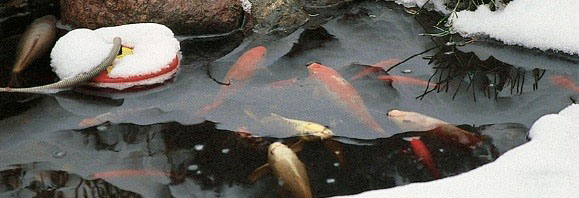Pros And Cons Of Running Your Pond Pump All Winter
“Can I Keep my Pond Pump Running All Winter?”
Many pond owners have had success with leaving their pond pump run all winter. And I am of the opinion, at times, “if it isn’t broke, don’t fix it.” However, with the unpredictability of Ohio weather, there are also good reasons to shut it down and things you need to be aware about if you are keeping it run all Winter.
“Running Water Does Not Freeze”
This is a true statement. That being said, if you have koi or other pond fish, it IS important to keep a portion of the surface open from icing over so that toxic gasses from fish waste and decomposing debris can escape. We also want oxygen to get back into the water to keep those pond fish healthy…and alive.
That is why we recommend pond de-icers.
What happens when the water along the stream splashes and freezes?
It can create beautiful, heartwarming, natural ice sculptures!
- Ice may cause dams and ramps for unfrozen water to leak outside of the liner and cause “sinking” along the edges.
- Water that freezes does not return to the pond until it melts.
- Water level in the pond drops, causing the pond to become shallow.
- If your pump is in a pond skimmer, and the water level drops below the opening, your pump will start sucking air; which can cause it to burn up if it goes unnoticed.
What should I do if I don’t run my pump in the winter?
- Pull your pond pump for the winter. This will ensure that water drains from your waterfall box and pipes so that they do not freeze and break.
- We recommend storing your pump in a bucket of distilled water in a place it will not freeze. Now is also a great time to clean your pump before storing.
- Keep your pond aeration system going all year. Even in the most extreme weather, it will help keep oxygen levels up, even under the ice.
- If your air stone(s) or diffuser(s) are on the very bottom of the pond though, we recommend moving them to about half the depth of your pond.
- Add a pond deicer. This is a unit that plugs into the outlet and keeps a small hole open on the surface of the pond. Most of them use less electricity than your pond pump and are thermostatically controlled – meaning it only will turn on when it needs to.
For more details closing you pond, please go to our blog on, “Steps for Shutting Down your Pond forWinter.”
But aren’t my pond fish just dormant for the winter?
Cold weather slows their activity and metabolism, but does not stop them. They continue to swim around and eat off the bottom as they deem necessary. Your koi and other pond fish do not feel cold the way we do; they are cold blooded. A fish’s body temperature is the same as the water they are in.
Running your pump exposes the water to the freezing atmosphere and then returns it to the pond. This will lower the temperature of your water, thus lowering the temperature of your koi and other pond fish. Cold water will reduce or stop your fish’s immune system, which may invite harmful bacteria, viruses and even parasites to attack your finned friends in the spring…but that’s another topic. Go to our, “Fish in the Winter” blog for more information.

In Summary - The benefits to shutting down your pond and NOT running your pump for the winter are as follows:
- Protects your koi and pond fish from the water temperatures bottoming out
- Protects your pump from running dry and burning up
- Protects your pond from losing water and causing damage to the structure
- In most cases, use less electricity
Pondless water features and ponds can most certainly be enjoyed all year long, but there are still seasonal steps and processes that need to be done. If you need any winter water feature accessories or pond supplies, shop here for winter pond supplies online or visit Hoffman’s Water X Scapes at our Uniontown location.
